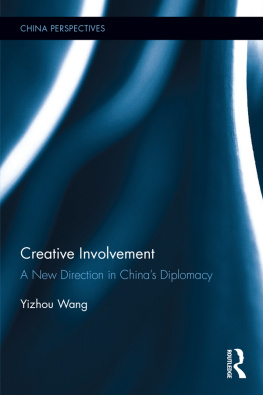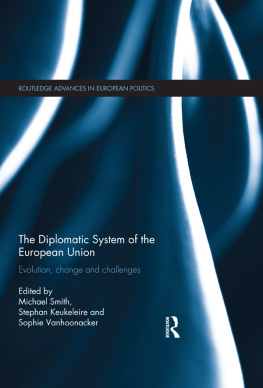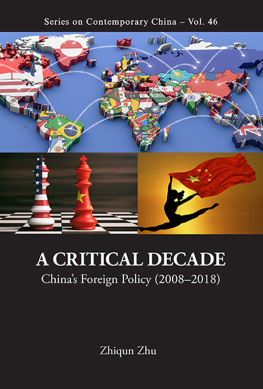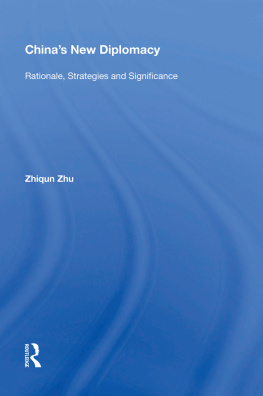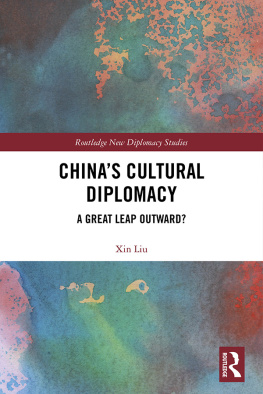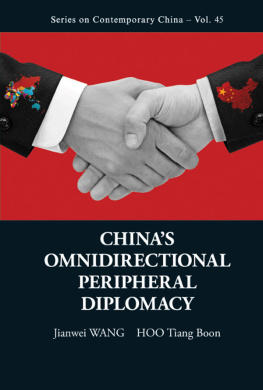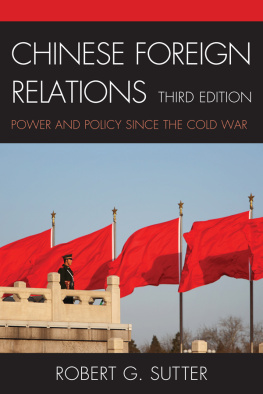Creative Involvement
With the enhancement of national strength, Chinas diplomacy has leapt onto a new high ground, basically obtaining the status of a world power. Meanwhile, it has also received a large amount of right and wrong mixed criticism and suggestions from different sides, in the face of a sudden increase in opportunities, pressures, and conflicts. The creative involvement in this book is exactly proposed for the future of Chinas diplomacy. In this book, the author first defines the concept creative involvement. Different from diplomatic theories in the traditional senses, creative involvement is a kind of diplomatic thinking which encourages more active participation in international affairs and advocates creative solutions. Then the author makes case studies on some events and people which have been of typical significance in Chinas diplomatic practices since the end of the Cold War, expounding their innovations and limitations. In the third part, the author turns to various supportive propositions, ideas, and theories concerning creative involvement and explains how they are applied to Chinas future diplomatic practice. Lastly, the author tries to set a number of scenarios, discussing the possible entry points for creative involvement.
Combining innovative theoretical idea with practical investigation, this book will not only contribute to contemporary China diplomatic studies but also appeal to scholars and students of international relations studies.
Yizhou Wang is a professor and the vice-dean of the School of International Studies, Peking University. His research interests include International Politics and International Relations.
China Perspectives
The China Perspectives series focuses on translating and publishing works by leading Chinese scholars, writing about both global topics and China-related themes. It covers Humanities and Social Sciences, Education, Media and Psychology, as well as many interdisciplinary themes.
This is the first time any of these books have been published in English for international readers. The series aims to put forward a Chinese perspective, give insights into cutting-edge academic thinking in China, and inspire researchers globally.
For more information, please visit www.routledge.com/series/CPH
Existing titles:
Chinese Cooperative-Harmonious Democracy
Zongchao Peng, Ben Ma, Taoxiong Liu
Scientists Impact on Decision-making
A Case Study of the China Hi-Tech Research and Development Program
Peng Ru
Forthcoming titles:
China: Tackle the Challenge of Global Climate Change
Angang Hu, Qingyou Guan
Creative Involvement
The Evolution of Chinas Global Role
Yizhou Wang
Chinas Historical Choice in Global Governance
Yafei He
Creative Involvement
A New Direction in Chinas Diplomacy
Yizhou Wang
Creative Involvement
A New Direction in Chinas Diplomacy
Yizhou Wang
This book is published with financial support from the Chinese Fund for the Humanities and Social Sciences.
Translated by Ping Lang
First published 2017
by Routledge
2 Park Square, Milton Park, Abingdon, Oxon OX14 4RN
and by Routledge
711 Third Avenue, New York, NY 10017
Routledge is an imprint of the Taylor & Francis Group, an informa business
2017 Yizhou Wang
The right of Yizhou Wang to be identified as author of this work has been asserted by him in accordance with sections 77 and 78 of the Copyright, Designs and Patents Act 1988.
All rights reserved. No part of this book may be reprinted or reproduced or utilised in any form or by any electronic, mechanical, or other means, now known or hereafter invented, including photocopying and recording, or in any information storage or retrieval system, without permission in writing from the publishers.
Trademark notice: Product or corporate names may be trademarks or registered trademarks, and are used only for identification and explanation without intent to infringe.
British Library Cataloguing-in-Publication Data
A catalogue record for this book is available from the British Library
Library of Congress Cataloging-in-Publication Data
A catalog record for this book has been requested
ISBN: 978-1-138-73313-8 (hbk)
ISBN: 978-1-315-18773-0 (ebk)
Typeset in Times New Roman
by Apex CoVantage, LLC
Since the first decade of the new century, Chinas diplomacy has leapt onto a new high ground. In my opinion, the new high ground has two seemingly contradictory, but in effect relevant remarkable features. First, with continuously growing comprehensive national strength and diplomatic efforts, China has basically obtained the status of a world power: almost all regional and global issues are increasingly inseparable from Chinas participation and position, and in some areas (such as promoting world trade and investment, large-scale promotion of poverty mitigation and disaster relief experiences, driving the global manufacturing boom, etc.), China even shows good prospects for promoting the progress of the international community and making a greater contribution to the overall human civilization. There has never been such a situation during centuries of world modern history, and it was also a rare opportunity for the Chinese nation, which accounts for one fifth of the global population. Of course, it also embodies the hard work of Chinese diplomats. Second, in the face of a sudden increase in both opportunities and pressures as well as a complex of internal and external conflicts, Chinas diplomacy has received a large amount of right and wrong mixed criticism and suggestions from different sides, the so-called lonely at the top, with obvious lack of adaptation (such as inadequate strategic initiatives at all levels, few international public goods offered, incapability of properly dealing with international non-governmental organizations and public opinion, certain introduced policies lacking of credibility, disparities in diplomatic departments self-assessment and external evaluations). More and more people realized that Chinas diplomacy is now in urgent need of self-renewal and re-positioning and of striking a new balance between the predetermined direction and moderate adjustment, namely, on the basis of the basic line of reform and opening-up and peaceful development, making greater involvement in international affairs and making a difference.
The creative involvement in this book is exactly put forward for Chinas diplomacy on the high ground. It is neither a systematic ideological doctrine nor a logical assumption nor a kind of international relations and diplomatic theory in a traditional sense,1 but an introductory guidance at a level between metaphysical theory and specific policies, or it can also be said to be a kind of diplomatic thinking which encourages more active participation in international affairs and advocates creative solutions. Such creative involvement discourse was mainly inspired by some success stories of Chinese diplomacy in recent years, considering the continuity of Chinese traditional culture and diplomatic style, referring to the international practices and trends, and trying to explore the Chinese characteristics in dealing with foreign affairs. In general, creative involvement encompasses three main ideas: (1) it holds that the overall trend of peace and development in the world has not changed; the trend of continued growth and deepening external dependence has not changed. Such awareness constitutes the background of making Chinas diplomacy more gelivable; (2) it particularly stresses the instructive, proactive, and constructive role of Chinas diplomacy, viewing the shaping of favorable and widely recognized international rules and discourse and striving to settle disputes through a peaceful, cooperative, and win-win approach as the focal point to reinforce the do something big policy; (3) it refuses to be the prisoner of habitual thinking and practices, but rather emphasizes employing creative ways of mediation or clever ideas to deal with difficulties and challenges, trying to avoid falling into confrontations by simple and tough solutions. Some diplomatic practices of creative involvement before and after the new century indicated a coming era for Chinas diplomacy to play a bigger role and shoulder more responsibilities, revealing the source of strength for a more active and positive foreign relations in the future. Creative involvement certainly needs to pay a high price in gathered wisdom and efforts, which seemingly place a burden of cost and toil on diplomats and politicians; however, it also has good returns. Most importantly, it expands the favorable space for Chinese diplomats to foster strength and circumvent weaknesses and to show its mettle; it will create more material wealth and a better external image for the people and the country, highlighting the peace-loving spirit and the wisdom of the Chinese nation.

